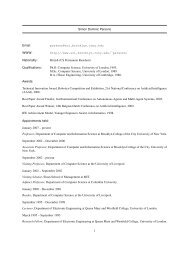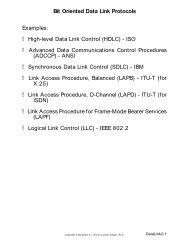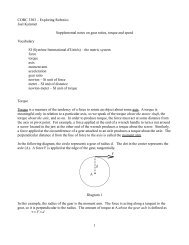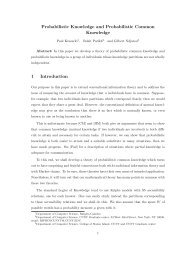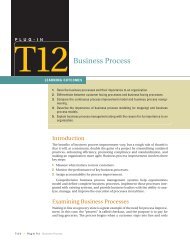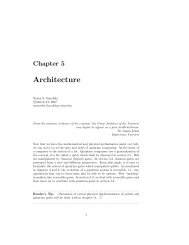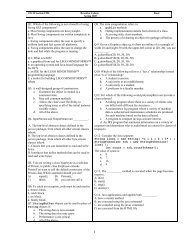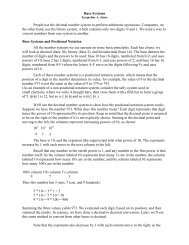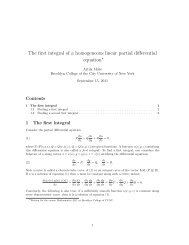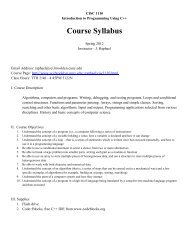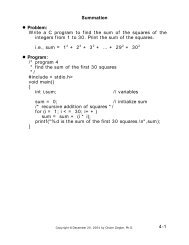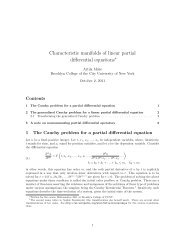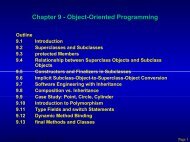*302 Greig and Others v Insole and Others 1977 G. No. 22461977 J ...
*302 Greig and Others v Insole and Others 1977 G. No. 22461977 J ...
*302 Greig and Others v Insole and Others 1977 G. No. 22461977 J ...
Create successful ePaper yourself
Turn your PDF publications into a flip-book with our unique Google optimized e-Paper software.
[1978] 1 W.L.R. 302 Page 29<br />
[1978] 1 W.L.R. 302 [1978] 3 All E.R. 449 (1978) 122 S.J. 162 [1978] 1 W.L.R. 302 [1978] 3 All E.R. 449 (1978)<br />
122 S.J. 162<br />
(Cite as: [1978] 1 W.L.R. 302)<br />
right to rescind a contract to exercise such right.<br />
Mr. Morritt, on behalf of World Series Cricket, submitted<br />
to the contrary <strong>and</strong> referred me in this context<br />
to the decision in<br />
Keane v. Boycott<br />
(1795) 2 H. B1. 511 . In that case, the<br />
plaintiff brought an action against the defendant for<br />
enticing away from his service his servant who was<br />
an infant. Eyre C.J. held that the contract between<br />
the servant <strong>and</strong> his master was voidable, not void,<br />
<strong>and</strong> that the voidability of this contract provided no<br />
defence to the action. As he said, at p. 515:<br />
“For this is the case of a stranger <strong>and</strong> a wrong-doer<br />
interfering between the master <strong>and</strong> servant, <strong>and</strong><br />
now seeking to take advantage of the infant's privilege<br />
of avoiding his contracts, a privilege which is<br />
personal to the infant, <strong>and</strong> which no one can exercise<br />
for him.”<br />
In reliance on this decision, Mr. Morritt submitted<br />
that, if the other elements of the tort are present, it<br />
matters not that the contract interfered with was<br />
voidable. More recent judicial dicta, however, suggest<br />
that the tort is not committed, if the interference<br />
in question results not in any breach of the relevant<br />
contract, but merely in a party exercising a<br />
lawful right to terminate it.<br />
Thus in D. C. Thomson & Co.<br />
Ltd. v. Deakin [1952] Ch. 646 , 702, Morris<br />
L.J. said:<br />
“If A has a contract with B, the tort will be committed<br />
by X if there is a violation of the right B has under<br />
his contract by the intentional interference of X.<br />
If the contract between A <strong>and</strong> B is lawfully terminated,<br />
there is no violation.”<br />
A passage from the judgment of Diplock<br />
L.J. in Emerald Construction Co. Ltd. v.<br />
Lowthian [1966] 1 W.L.R. 691 , 703–704,<br />
can be read in much the same way.<br />
In the two last mentioned cases the court was not,<br />
in terms, considering the situation where a contract<br />
could be lawfully terminated not so much because<br />
of rights given by the contract as because one of the<br />
parties had a right to rescind it on the grounds of<br />
misrepresentation or undue influence. Nevertheless<br />
the dicta cited appear to be of general application.<br />
For the purpose of this judgment, therefore, so far<br />
as it is relevant at all, I propose to assume in favour<br />
of the defendants, without deciding, that it does not<br />
constitute a tort for a third party to induce a person<br />
to exercise a lawful right to rescind a contract.<br />
In the light of this introduction, I now turn to consider<br />
whether the five essential ingredients of the<br />
tort of interference with contractual relations are<br />
present in relation to the ICC.(2)<br />
“Direct interference<br />
First, has there been interference by the<br />
ICC with the players' contracts with World Series<br />
Cricket <strong>and</strong>, if so, has that interference been of a<br />
“direct” nature? Though there have been many decisions<br />
indicating whether particular stated sets of<br />
facts constitute “direct,” as opposed to “indirect,”<br />
interference, I have been referred to no statement of<br />
principle *334 which specifically<br />
defines the difference between the two types of interference.<br />
I take it, however, that the phrase “direct<br />
interference” covers the case where the intervener,<br />
either by himself or his agents, speaks, writes or<br />
publishes words or does other acts which communicate<br />
pressure or persuasion to the mind or person<br />
of one of the contracting parties themselves, while<br />
“indirect interference” refers to the case where,<br />
without actually doing any of these things, the intervener<br />
nevertheless procures or attempts to procure<br />
a situation which will result or may result in a<br />
breach of the contract see, for example, J.<br />
T. Stratford & Son Ltd. v. Lindley [1965] A.C. 269<br />
, 333, per Lord Pearce:<br />
D. C. Thomson & Co. Ltd. v. Deakin<br />
[1952] Ch. 646 , 678, per<br />
Evershed M.R.<br />
Has there been direct interference in this sense by<br />
the ICC with the contracts of World Series Cricket<br />
© 2011 Thomson Reuters.



